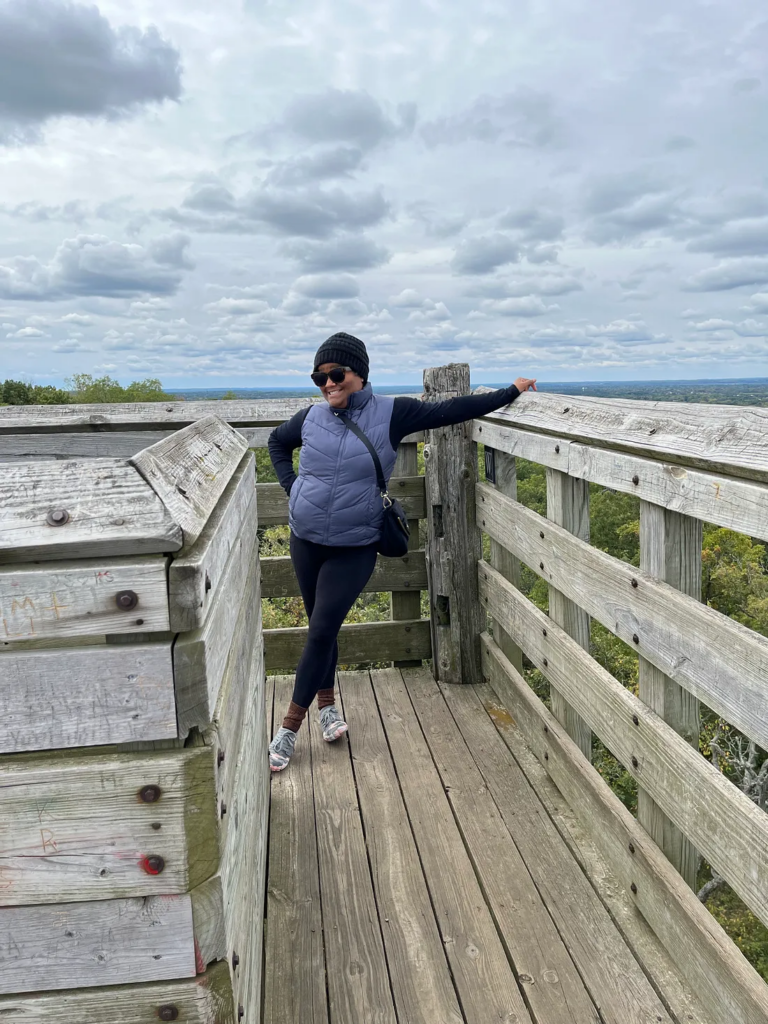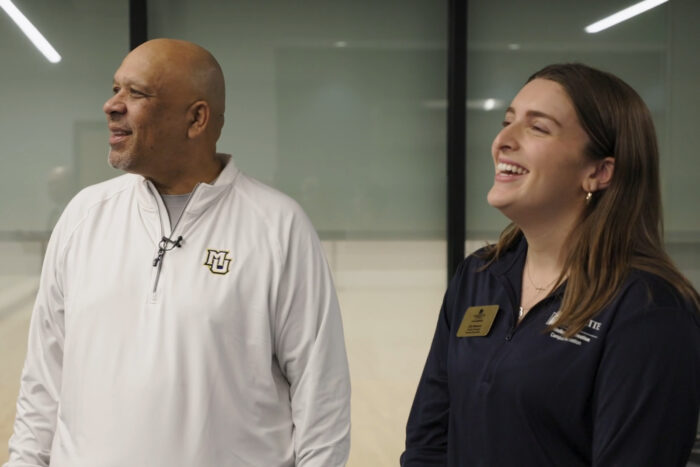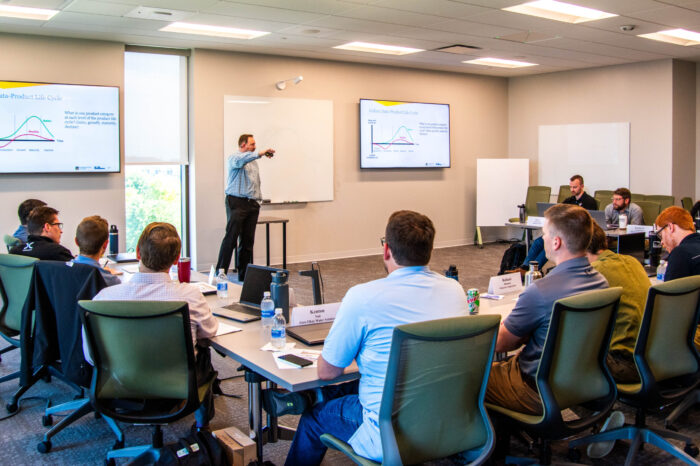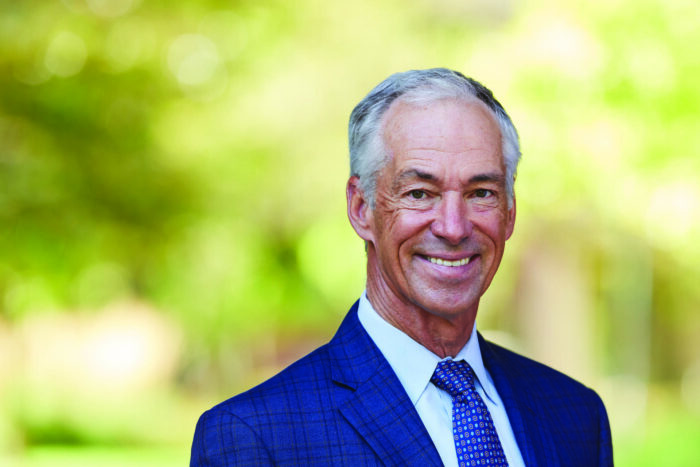This story is part of an interview series highlighting a wide range of educators at Marquette, started by Melissa Shew, associate director of Teaching Excellence, and Jennifer Maney, director of the Center for Teaching and Learning.
Hosted through the CTL, this interview series pays special attention to teaching as a profession and vocation at Marquette. All kinds of instructors and faculty will be profiled.
If you would like to recommend yourself or someone you know to be profiled in this series, please send an email with the person’s/people’s name to Shew or email ctl@marquette.edu with the subject line: CTL SPOTLIGHT SERIES. Please provide a brief description about the person (whether you or someone else). After consideration, the CTL will respond to work with the individual or team of educators.

Dr. Karisse Callender
Assistant professor, Department of Counselor Education and Counseling Psychology
Director of Counselor Education
College of Education
Teaching at Marquette since fall 2017
What do you find challenging about teaching?
As a counselor educator, I help to train future counseling professionals who will go out to work in various settings (eg., community organizations, hospitals, private practice, or schools). Students are also trained to meet criteria as a licensed professional counselor — this is a huge responsibility! Having said that, students usually want to know concrete answers for complex and fluid situations. For example, I often remind students that what they learn in the textbook and in class may be the “ideal” situation. However, human beings are unpredictable and complex, therefore the approach to counseling should be flexible enough to accommodate unexpected changes. It’s sometimes difficult for students to embrace “it depends” as an answer.
What led you to teaching as your career or part of it?
I never wanted to teach. I always saw myself in a primarily clinical role and engaging in wellness-related research, program development and instrument development. However, during my master’s training internship, I observed many things that seemed unprofessional and unethical, and I would often ask myself “who taught them that this was okay to do?” That motivated me to explore counselor education programs where I can learn how to teach and train future counselors.
My hope was that if I could make a positive difference in one student’s life, where that student would be intentional and ethical in therapeutic relationships, then I would know that my work was worth it.
What have you learned about yourself and/or your discipline through your teaching?

Although my doctoral degree is in counselor education, where I learned a lot about pedagogy and teaching future counselors, I have learned over the past seven years that as I change personally, my style of teaching also changes. For example, when I first started teaching in my doctoral program, I mirrored a lot of my supervising faculty’s teaching techniques because it worked well for me. Then, when I started teaching at Marquette, I was rigid and kept doubting myself because I no longer had the “cushion” of a supervising faculty. I eventually got comfortable and grew into my own style, which is a beautiful combination of what I admired in my mentors and my own personal style.
I have learned how to embrace cura personalis and Ignatian strategies in my teaching, and I continue to learn from my students about what works best for their learning.
Please share a favorite quote about teaching and learning.
One of my favorite quotes about teaching and learning comes from my dad. I grew up in a home where education was valued and encouraged. Although my parents are very supportive of my decisions and autonomy, when I debated whether to apply to Ph.D. programs or continue working as a clinician, my dad said to me, “Anyone can take away your job, but no one can take away your education.” Those words continue to motivate me today.
The second quote comes from a former professor and now friend and mentor from my master’s training at the University of Wisconsin-Stout, Dr. John Klem. One summer we were catching up and talked about teaching and some challenges we were experiencing, and I mentioned that I wanted to find different strategies to motivate students. In addition to sharing some great suggestions, he made a statement that resonated with me, “Good counselors are curious.” I often share this statement with students, and I also remind myself that good teachers and researchers are also curious.
When have you failed as an educator? What does that feel like?

I can think of several times I believe I failed as an educator, and each experience had a lasting impact on my approach to teaching. One perceived failure happened in an experiential class. During one skill demonstration, the student didn’t seem invested in the practice. After the class, I emailed the student to check in and before waiting for the student’s response, I went right into a “lecture” about self-care and the importance of being fully present when needed. I went as far as to tell the student something to the effect of “I expected better.”
The student responded in a distressed tone, sharing that I made assumptions that were not fair. Instead of an email response, I offered to meet in person. It turned out the student was dealing with a personal issue that night in class and to be a good student and responsible, showed up to class for the class presentation. I was disappointed in myself and immediately apologized for the assumptions I made. We were able to talk things through, however, the guilt lingered all semester on my end. In my opinion, I failed this student. I made assumptions, was unnecessarily critical, and did not give the student a chance to explain before I went into my mini “lecture” via email.
How do you help students learn in your class?
I believe students learn best in an environment where they are engaged with a variety of teaching methods and when they feel respected, encouraged and empowered as an individual and as part of a team.
As a counselor educator, I believe it is essential for students to make personal connections with the material they learn. For example, I encourage students to reflect on personal reactions to the content, or to think about how they would like to receive treatment if they were in the client’s situation.
I also enjoy having at least one assignment that allows them to apply the skills they learned (eg., through a case study), role plays and connecting material to current events. I place strong emphasis on and deeply value the learning process. This means I approach teaching and learning from a constructivist perspective and use scaffolding to teach skills. For example, students learn definitions and history of a particular therapeutic intervention, then I may show a video demonstration or demonstrate the skill to the students, then the students practice the skill while I walk around the class to give them live feedback.

What do you wish students would know about you specifically, or about Marquette educators generally?
I hope students know that I genuinely care about their personal and professional development and that their unique experiences are seen and valued in my classroom. My classroom and office are spaces where they can be vulnerable, make mistakes, share accomplishments and ask questions.
I welcome curiosity and respectful critique (please remember there is a human being on the receiving end of the critique), and I am open to hearing their perspectives.
Non-astonishing teaching tip time! Please share one favorite thing you do in class or with your students that you think everyone should try.
Don’t be afraid to use creativity in the classroom to help students learn (yes, even graduate students!). In one class on career development, I used a card sort to help students create a professional values statement that they can use when applying for jobs or doctoral programs.

Check out Callender’s personal website, Mindful Quality of Life, a research and education community with a focus on quality of life using mindfulness-based practices and Dialectical Behavior Therapy through a cultural lens. Follow her on Instagram here.
If you would like to recommend someone you know (or yourself) to be profiled in this series, email ctl@marquette.edu. Please provide a very brief description about the educator and/or why you think they should be highlighted. After consideration, the CTL will contact your nominee to start the interview process, which will entail the educator responding in writing briefly to different interview questions from a menu of choices.


